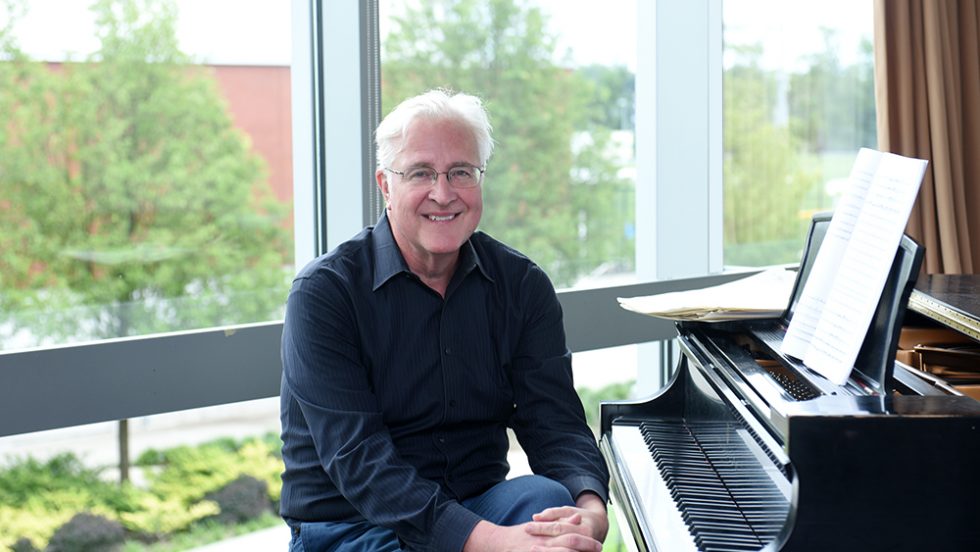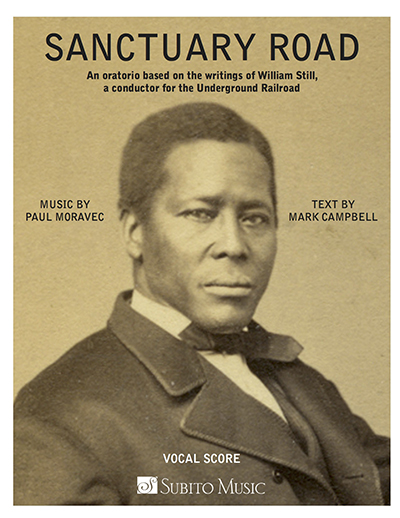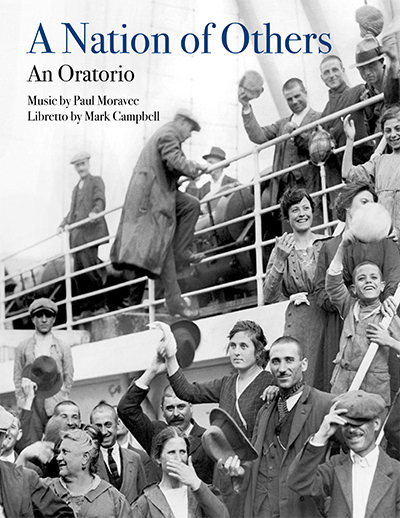
University Professor Paul Moravec, DMA, scored a Grammy nomination and thousands of new fans for the oratorio Sanctuary Road, even as performances went virtual during the pandemic. He won a Pulitzer Prize for Tempest Fantasy in 2004.
For Pulitzer Prize-winning composer and University Professor Paul Moravec, DMA, the past 18 months have been relatively quiet: Premieres have been postponed and in-person concerts have become online viewing. “To get a sense of how different things are this year,” he said, “you should have seen my schedule before the pandemic hit.” Yet Dr. Moravec’s compositions remain as popular as ever, with thousands around the globe streaming his concertos, oratorios and operas.
During the pandemic, a recording of Dr. Moravec’s oratorio Sanctuary Road, an epic dramatic work first performed at Carnegie Hall in May 2018, was nominated for a Grammy Award for Best Choral Performance. When it came time to tune into the 2021 Grammy Awards show, which was performed without a live audience for the first time in history, first-time nominee Dr. Moravec joined viewers to watch the ceremony from home.
Bringing Stories of the Underground Railroad to Life

Dr. Moravec began work on Sanctuary Road in 2016 with his frequent collaborator, award-winning librettist Mark Campbell. The piece is based on The Underground Railroad, the 1882 memoir by William Still, an abolitionist, businessman and civil rights leader. Chronicling his experience as an Underground Railroad conductor, Still’s book is filled with narrow escapes and the harrowing struggles of enslaved people seeking freedom.
Part of what made Still’s story so compelling, said Dr. Moravec, is how meticulous he had been in documenting the life of every person who came to him seeking help.
“Still was an active participant and a driving force in the Underground Railroad,” Dr. Moravec said. “It puzzles me that he’s not as well known as Harriet Tubman. No biography of his amazing life has been written yet, either.” In the program notes for the original Carnegie Hall performance, Dr. Moravec wrote, “The epic nature of this historical saga brings to my mind the Old Testament oratorios of Handel and the Passions of Bach. Along these lines, when William Still narrates ‘the death struggles of slaves in their efforts of freedom,’ his role is similar to that of Bach’s Evangelists.”
Sanctuary Road’s libretto is largely taken from Still’s memoir. “Mark Campbell used a lot of the text verbatim, so you have Still onstage singing his own words,” Dr. Moravec said. But it’s not just Still who’s narrating his journey. The oratorio contains episodes of several of the almost 800 enslaved people Still aided, including a “very improbable-sounding but well-documented” tale of an enslaved man named Henry “Box” Brown, who had himself nailed into a crate and mailed to Philadelphia.
Dr. Moravec’s score is built on what he terms a “freedom” motif. Variations on the motif are heard in a minor key throughout the oratorio, but it finally returns in a major key in the waning moments of an aria called “Rain,” a moment that one reviewer called “suddenly, powerfully moving.” Other reviews of the oratorio were equally laudatory. The classical music magazine Gramophone noted, “The relevance of Sanctuary Road…in our present century cannot be overstated,” while music review site Black Grooves proclaimed, “Sanctuary Road is a modern choral masterpiece, representing struggle and hope in the best of the oratorio tradition.”
Sanctuary Roadhas also been recognized by the National Endowment for the Arts, which awarded a grant to the North Carolina Opera to produce an operatic version of the piece. Dr. Moravec and Campbell are now hard at work on this expanded version of Sanctuary Road, set to premiere in 2022. A new section has been added that recounts the story of a man who comes to Still in search of his mother. As the man talks about his life, Still realizes that they are brothers—a scene that adds yet another layer of emotion, said Dr. Moravec, to an already powerful narrative.
Drawing Inspiration from Historical Texts
 Sanctuary Roadis the second in a three-part series of what Dr. Moravec—renowned for his “fine form in dramatising compelling moments in history” (BBC Music Magazine)—calls his “American historical oratorios.” The first, The Blizzard Voices, narrates the 1888 “Children’s Blizzard” that killed hundreds of schoolchildren on the Great Plains. The third, A Nation of Others, tells the story of immigrants arriving at Ellis Island in 1921; the piece was slated to premiere at Carnegie Hall in May 2020 before being postponed due to the COVID-19 pandemic.
Sanctuary Roadis the second in a three-part series of what Dr. Moravec—renowned for his “fine form in dramatising compelling moments in history” (BBC Music Magazine)—calls his “American historical oratorios.” The first, The Blizzard Voices, narrates the 1888 “Children’s Blizzard” that killed hundreds of schoolchildren on the Great Plains. The third, A Nation of Others, tells the story of immigrants arriving at Ellis Island in 1921; the piece was slated to premiere at Carnegie Hall in May 2020 before being postponed due to the COVID-19 pandemic.
A Nation of Others is not Dr. Moravec’s only work documenting the immigrant experience. Last August, Bridgehampton Chamber Music’s Summer Festival at Home featured an online concert called Dvořák/Moravec: A New Country, which opened with two pieces by Antonín Dvořák, a composer who himself immigrated to America at the end of the 19th century. Dvořák’s works were followed by a song cycle written by Dr. Moravec—his third commission from Bridgehampton Chamber Music—for mezzo-soprano, flute, violin, viola, cello and piano. The piece incorporates poetry about the lives of immigrants by literary luminaries like Walt Whitman and Emma Lazarus.
Joining Adelphi in Celebrating the United Nations
Dr. Moravec’s work was enjoyed by a vast international audience last fall, when the Adelphi Symphony Orchestra celebrated the 75th anniversary of the United Nations with the livestreamed A Concert for the Future We Want. Among the works performed was his Autumn Song, a concerto for flute and chamber orchestra.
In 2004, Dr. Moravec was awarded the title of University Professor at Adelphi—the same year he won a Pulitzer Prize for Tempest Fantasy, a five-part chamber work for violin, cello, piano and clarinet. Then-Provost Steve Everett, DMA, who is also a composer, believes Dr. Moravec has helped raise the stature of the University’s already highly regarded music program. “We are so fortunate that Paul Moravec, winner of one of the most prestigious prizes in our nation, has made his home at Adelphi,” he said.
Raising Spirits During Covid-19 and Beyond
In the thick of the pandemic, many who might not count themselves among the ranks of classical music aficionados were introduced to Dr. Moravec’s work by way of YouTube. Light Shall Lift Us, a video that has amassed nearly 25,000 views, features more than 100 opera singers in “a song of hope and solidarity.” Dr. Moravec and Mark Campbell originally wrote the piece for One Voice Orlando, a benefit organized by Opera Orlando in response to the 2016 Pulse nightclub shooting in Orlando, Florida.
“When the pandemic hit, we started thinking of a way to help out the service organization OPERA America and all these opera singers who were out of work,” he said. “Then we hit on the idea of adapting Light Shall Lift Us. Everyone involved in creating the video worked pro bono, from the musicians to the technicians.” The experience, he reports, was “exhilarating.”
As the pandemic recedes and arts venues begin to reschedule live performances, Dr. Moravec looks forward to seeing his pieces performed for audiences in concert halls and opera houses once again. Minnesota Opera will soon be reviving his opera The Shining, based on the famous Stephen King novel. The piece’s critically acclaimed, sold-out world premiere in 2016 was the biggest hit Minnesota Opera ever had, according to Dr. Moravec.
The Shining, which takes place at a remote inn in the mountains of Colorado, is also scheduled, appropriately enough, for next season at Opera Colorado. “Opera is about three things: love, death and power,” Dr. Moravec said. “Those are three things that you find in Stephen King’s story, so it’s a perfect match. I can’t wait to see this production.”